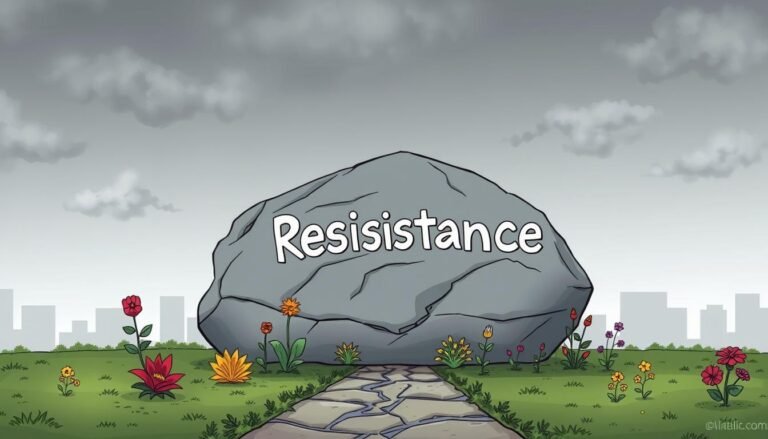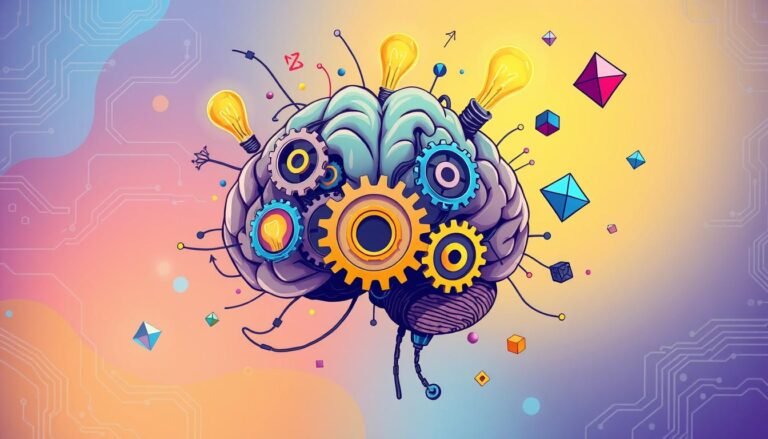Interpersonal Conflict Resolution Psychology
Interpersonal conflict resolution psychology explores how we interact with each other. It helps us understand and manage disagreements better. This field uses strategies, emotional intelligence, and communication to improve relationships in many areas.
Recent studies show that young people are facing more social anxiety. This might make them avoid conflicts more. A big study with over 2,000 people aged 33 to 84 found that tackling conflicts head-on can lower stress and negative feelings. It also helps keep positive feelings stable over time.
Knowing how to resolve conflicts is key in today’s fast world. By improving communication and emotional intelligence, we can handle conflicts better. This leads to better mental health, resilience, and productivity.
Key Takeaways
- Social anxiety contributes to conflict avoidance
- Intentional conflict resolution reduces stress and negative emotions
- Conflict avoidance can harm relationships and personal well-being
- Emotional intelligence plays a vital role in managing conflicts
- Effective communication skills are essential for resolving disagreements
- Understanding different conflict types helps in choosing appropriate resolution strategies
Understanding the Nature of Interpersonal Conflicts
Interpersonal conflicts are a normal part of life. They happen when people disagree on goals, values, or expectations. These disagreements can affect both personal and work relationships. Let’s look at what makes up these conflicts and their effects.
Defining Interpersonal Conflict
When two or more people can’t agree, it’s a conflict. James McCroskey and Virginia P. Richmond say conflict is about anger, distrust, and suspicion. But, it can also help us grow and understand each other better.
Common Causes of Interpersonal Conflicts
Conflicts often come from:
- Differing values and beliefs
- Miscommunication or misunderstandings
- Competing interests or goals
- Personal differences in communication styles
- Unmet expectations
Impact on Personal and Professional Relationships
Conflicts can be tough, but they also offer chances for growth. When managed well, conflicts can:
- Make relationships stronger and more trusting
- Improve how we communicate
- Help us find new solutions
- Help us grow emotionally
In work settings, handling conflicts well can make teams work better together. Many companies now see the value in teaching how to solve conflicts and improve relationships at work.
“Conflict is a normal, inevitable part of life.” – Dudley D. Cahn and Ruth Anna Abigail
It’s key to understand conflicts to manage them better. Whether at home or at work, learning to deal with conflicts can make our interactions more rewarding and productive.
The Psychology Behind Conflict Avoidance
Conflict avoidance is a common behavior with deep psychological roots. People often avoid disagreements to avoid discomfort. But, this can lead to long-term problems. It’s important to understand why we do this to improve our anger management and emotional intelligence.
Fear is a big reason for avoiding conflict. Many fear upsetting others or facing social rejection. This fear can come from growing up in critical or dismissive environments. While avoiding fights might feel good at first, it usually leads to unresolved issues and strained relationships.
Research shows that avoiding conflict can have serious effects:
- Escalation of disagreements into major conflicts
- Power struggles and feelings of disrespect
- Emotional unsafety in relationships
- Evasion of accountability
To overcome conflict avoidance, we need to develop emotional intelligence and practice good communication. Setting clear boundaries, practicing acceptance, and using mindfulness can help. Sometimes, working with a mental health professional can help address underlying issues and teach better coping strategies.
“Engaging in conflict can lead to strengthening relationships and building stronger bonds.”
By understanding the costs of avoiding conflict and facing issues head-on, we can build healthier relationships and personal growth. Remember, dealing with conflicts with empathy and respect is key to emotional intelligence and managing anger.
Types of Interpersonal Conflicts in Daily Life
Interpersonal conflicts are common in our daily lives. Knowing about these conflicts helps us improve our communication and manage conflicts better. Let’s look at the different types of conflicts we face.
Pseudo Conflicts and Misunderstandings
Pseudo conflicts often come from miscommunication. This includes teasing, badgering, or misunderstanding someone’s intentions. Even though they seem small, dealing with them quickly can stop them from getting worse.
Value-Based Conflicts
These conflicts happen when people have different beliefs or values. They can be hard to solve because they touch on who we are. Good communication is key to handling these sensitive issues.
Fact-Based Conflicts
Disagreements about information or data fall here. These can be solved by checking facts and sharing correct information. Clear communication is essential in solving these conflicts.
Ego Conflicts
Ego conflicts happen when personal pride is involved. They often mean wanting to ‘win’ over others. Good conflict management strategies aim for solutions that benefit everyone, not just one person.
| Conflict Type | Key Characteristic | Resolution Approach |
|---|---|---|
| Pseudo Conflicts | Misunderstandings | Clear communication |
| Value-Based | Differing beliefs | Respectful dialogue |
| Fact-Based | Information disputes | Verification of facts |
| Ego Conflicts | Personal pride | Focus on mutual benefits |
Knowing about these conflict types helps us pick the right ways to solve them. By improving our communication and using effective conflict management, we can handle daily conflicts better.
Essential Communication Skills for Conflict Resolution
Effective communication is key to solving conflicts. By learning these skills, you can turn disagreements into chances for growth. Let’s look at important techniques for successfully resolving conflicts.
Active Listening Techniques
Active listening is crucial for conflict resolution. It means focusing fully on what the other person says, without interrupting. This shows respect and builds trust.
- Give your full attention to the speaker
- Use nonverbal cues like nodding to show engagement
- Paraphrase to confirm understanding
- Ask open-ended questions for clarity
Effective Verbal Communication
Clear and respectful words are important in conflicts. Use “I” statements to share your feelings without blaming. State your needs clearly and calmly. It’s about finding a solution together, not winning.
Non-Verbal Communication Cues
Your body language is very important. Keep an open posture, make eye contact, and speak calmly. These cues can help calm tense situations and create a better atmosphere for solving problems.
By improving these communication skills, you’ll handle conflicts better. Remember, practice makes perfect. The more you use these techniques, the more natural they’ll become. This will lead to stronger relationships and better outcomes in all areas of life.
Emotional Intelligence in Conflict Management
Emotional intelligence is key in managing conflicts. It helps us understand and control our feelings and those of others. This skill is essential for clear communication and solving problems during disputes.
Those with high emotional intelligence are great at resolving conflicts. They can:
- Identify personal triggers
- Regulate disruptive emotions
- Show empathy towards others
- Build trust through effective communication
Studies show emotionally intelligent mediators are more trustworthy and fair. They help teams work together better and prevent future problems by tackling the root causes.
“Understanding and applying emotional intelligence in conflict resolution can lead to optimal outcomes for teams.” – Bob Jerus, Emotional Intelligence Expert
To improve emotional intelligence for better conflict management, try these methods:
- Practice self-reflection
- Engage in active listening
- Develop mindfulness
- Seek emotional intelligence training
| EI Component | Conflict Management Benefit |
|---|---|
| Self-awareness | Recognizing personal emotions and their impact |
| Self-regulation | Managing disruptive emotions effectively |
| Empathy | Understanding others’ perspectives |
| Social skills | Building relationships and fostering cooperation |
By improving emotional intelligence, we can turn conflicts into chances for growth and teamwork. This skill is crucial in both our personal and professional lives. It helps us build better relationships and work environments.
Interpersonal Conflict Resolution Psychology
Conflict resolution psychology helps us deal with disagreements better. It looks into different ways to handle conflicts and strengthen relationships.
Theoretical Frameworks
Many theories guide how to solve conflicts. The cognitive-behavioral approach helps change our thoughts and actions. Psychodynamic theories look at what’s hidden behind our conflicts. Systemic approaches consider the bigger picture of our relationships.
Psychological Approaches
Good conflict management includes listening well, managing stress, and controlling emotions. Studies show these methods work well in both personal and work life. Relationship counseling uses these techniques to help couples fix their issues.
Behavioral Patterns
It’s important to know common conflict behaviors. There are five main ways to handle conflicts:
- Competing: High concern for self, low for others
- Avoiding: Low concern for both self and others
- Accommodating: Low concern for self, high for others
- Compromising: Moderate concern for both
- Collaborating: High concern for both
These styles are learned and depend on the situation. Interestingly, women are just as competitive as men in relationships. Knowing these patterns helps us choose the right approach for each conflict.
Mediation Strategies and Techniques
Mediation techniques are key in solving conflicts. Professional mediators use special methods to help people talk and find solutions they both agree on. Let’s look at different mediation strategies and how they work.
Professional Mediation Methods
Professional mediators use many strategies to manage conflicts. They create a neutral space for good communication. They guide parties through stages like conflict analysis, negotiation, and finding a solution.
One important strategy is helping parties understand their interests and possible outcomes. Mediators help weigh options and plan a consistent approach. They also build trust and ensure everyone is committed to the mediation.
Self-Mediation Practices
Self-mediation can work for personal conflicts. It means using mediation techniques to solve disputes without a third party. It includes listening well, stating needs clearly, and finding solutions together.
Group Conflict Resolution
Group conflicts need special mediation techniques. These strategies aim to improve team communication and teamwork. Mediators might use conflict mapping to understand group dynamics and create specific plans for resolution.
| Mediation Type | Key Strategies | Application |
|---|---|---|
| Professional Mediation | Structured approach, interest identification | Formal disputes, legal matters |
| Self-Mediation | Active listening, clear expression | Personal conflicts, minor disagreements |
| Group Mediation | Conflict mapping, team communication | Workplace conflicts, community issues |
Good mediation techniques can turn conflicts into chances for growth and understanding. By using these strategies, people and groups can find lasting solutions and better relationships.
Building Collaborative Solutions
Conflict management often aims to build solutions that everyone agrees on. This method brings all sides together to find common ground. Through good negotiation, teams can achieve positive results for everyone.
Collaborative problem-solving needs open talk and a readiness to give in. Teams with strong people skills do well here. They see better customer satisfaction and loyalty. Companies like Zappos and Ritz-Carlton are known for their great service.
To create collaborative solutions, try these strategies:
- Practice active listening to understand all perspectives
- Encourage creative thinking to find innovative resolutions
- Foster a culture of respect and open dialogue
- Use empathy to connect with others’ viewpoints
Training in conflict resolution and emotional intelligence can boost these abilities. By growing traits like adaptability and teamwork, teams can find solutions that go beyond what’s expected. This method not only solves conflicts but also strengthens bonds and boosts team spirit.
The Role of Empathy in Conflict Resolution
Empathy is a strong tool for solving conflicts. It helps us understand and share feelings in our daily lives. By improving emotional intelligence, we can handle disagreements better.
Understanding Different Perspectives
Seeing things from another’s point of view is key. Research shows 85% of conflicts could be solved with empathy. This skill stops misunderstandings before they grow into big problems.
Developing Empathetic Responses
Active listening is at the heart of empathy. It shows respect and acknowledges feelings, boosting conflict resolution by 70%. To grow this skill, ask open questions and reflect emotions.
Creating Emotional Connections
Empathy builds stronger relationships, cutting down conflicts by 60%. It creates a safe space for open talks in teams. Leaders who use empathy turn conflicts into chances for growth, leading to 75% more teamwork.
Source Links
- Interpersonal Conflict Resolution: Beyond Conflict Avoidance
- Interpersonal Conflict: What It Is and How to Resolve It
- The Dynamic Nature of Interpersonal Conflict and Psychological Strain in Extreme Work Settings
- Chapter 9: Conflict in Relationships
- 6.2 Conflict and Interpersonal Communication
- The Conflict Avoidant: Two Distinct Types
- Conflict Avoidance | Charlie Health
- 6.2 Conflict and Interpersonal Communication
- 3 Types of Conflict and How to Address Them
- Types of Interpersonal Conflict at Work
- Conflict Resolution Skills – HelpGuide.org
- Effective Communication Skills: Resolving Conflicts
- Using Constructive Communication to Resolve Conflict
- How Emotional Intelligence Impacts Conflict Resolution
- Emotional intelligence and conflict resolution in the workplace
- Emotional Intelligence In Conflict Resolution
- North Central College
- 9.2 Conflict Management Strategies
- Frontiers | Resolving Conflicts Between People and Over Time in the Transformation Toward Sustainability: A Framework of Interdependent Conflicts
- Summary of "The Mediation Process: Practical Strategies for Resolving Conflict"
- Conflict Resolution: Definition, Strategies & More [Complete Guide] – Pollack Peacebuilding Systems
- Conflict Management – StatPearls – NCBI Bookshelf
- Interpersonal Intelligence: Building Collaborative Teams
- The Power of Empathy in Conflict Resolution
- How Empathy Can Resolve and Prevent Conflict








